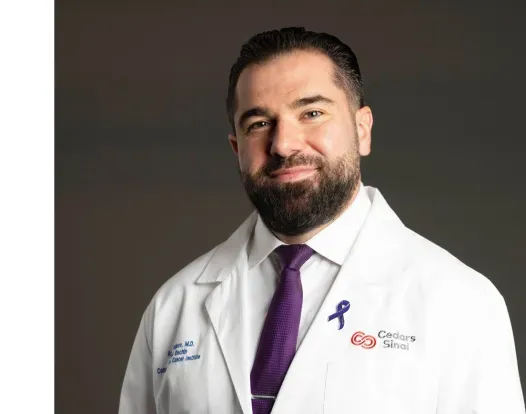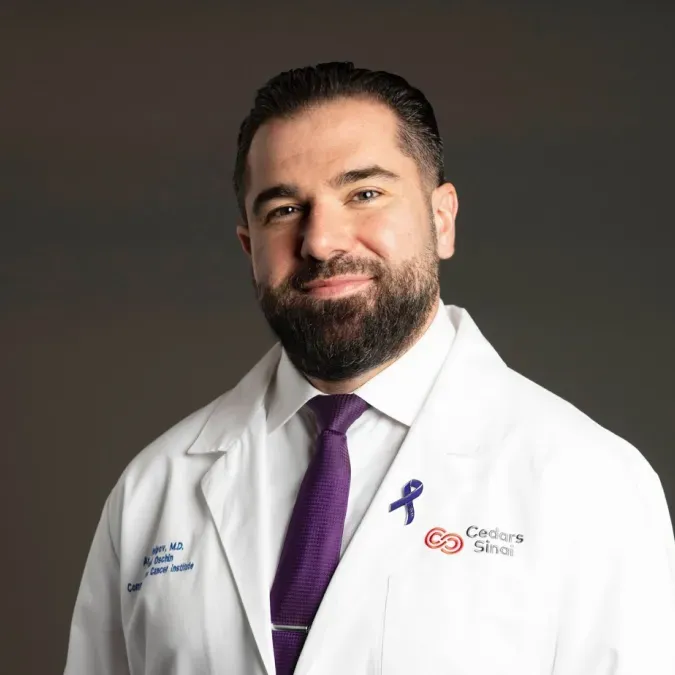These researchers have dedicated their careers to finding new treatments and cures for people with cancer.


It’s infamous as a “silent disease,” with symptoms that rarely make themselves known until too late. But one Conquer Cancer-funded researcher may have found a way to improve the odds, even for patients with advanced-stage pancreatic cancer.
Only 12 percent* of people with pancreatic cancer are alive five years after diagnosis, making it a very aggressive disease. It currently stands as the fourth leading cause* of cancer-related death in the U.S. Pancreatic cancer is also projected to become the second by 2030**.
Making matters worse, funding for pancreatic cancer research is notoriously scarce. Despite these disadvantages, immunotherapy—which has markedly advanced care for other types of cancer—may show promise for targeting pancreatic tumors. However, pancreatic cancer is quite stubborn when it comes to immunotherapy, making the need for more research critically urgent.
As a gastrointestinal oncologist at the Cedars-Sinai Samuel Oschin Comprehensive Cancer Institute, Arsen Osipov, MD, FACP, is addressing this problem through research. By weakening specific proteins that make pancreatic cancer so stubborn, Dr. Osipov hopes to render pancreatic tumors more vulnerable to immunotherapy.
“Pancreatic cancer is one of the most complicated malignancies, and unlocking its secrets may allow us to change the outcome for so many patients. We want to emulate the paradigm-shifting success of immunotherapy for other types of cancer, like melanoma and lung cancer, as we target this devastating disease,” Dr. Osipov says. “My focus is on finding a way to make pancreatic cancer more immune-sensitive by targeting proteins—like focal adhesion kinase (FAK)—that can achieve this effect.”
Shutting Off Tumor Shields
Supported by a Conquer Cancer grant, Dr. Osipov launched an initial study to better understand the unique tumor microenvironment (TME) of pancreatic cancers. Funding enabled him to recruit a team of research assistants, purchase the necessary supplies for conducting the study, and acquire new artificial intelligence software to assist with data analysis. These investments allowed Dr. Osipov and his team to explore potential methods for shutting off the FAK proteins that shield pancreatic tumors from immunotherapy.
“We found how FAK is a critical player in certain cells involved in the resistance of pancreatic cancer to immunotherapy, and it helped show that targeting it could alter the TME to make these tumors easier to target with immunotherapy,” Dr. Osipov explains. “My YIA allowed me to begin this research and laid the foundation for subsequent clinical studies.”
Further Refining Clinical Research
Building on the success of his initial research, Dr. Osipov then won another Conquer Cancer grant to further study how to target FAK proteins in pancreatic tumors. In the process, he and his team uncovered another gene, if targeted with FAK, may help patients with pancreatic cancer respond better to immunotherapy treatment.
“With my second Conquer Cancer grant, we expanded our clinical and translational work to understand the role of the dense fibroblast-rich stroma as a target,” Dr. Osipov says. “We further confirmed that targeting FAK is a viable way to alter the TME of pancreatic cancer, but even with these new approaches, pancreatic tumors can still have resistance pathways.”
Dr. Osipov and his team also found that targeting another specific protein—known as CXCR4—along with FAK could be effective when paired with immunotherapy.
This work inspired Dr. Osipov and colleagues to launch a collaborative project during which they targeted both FAK and CXCR4. The results showed immense promise for successfully treating pancreatic cancer, even when it has spread throughout the body.
“In a preclinical mouse study, we were able to completely eradicate metastatic pancreatic cancer. This work is now being translated into a clinical trial for patients,” Dr. Osipov says.
Patients Inspire Research Innovation
Drawing on insights from his Conquer Cancer–supported pancreatic cancer research, Dr. Osipov and his team have gone on to develop a new clinical trial, and some patients have already had outstanding responses. Dr. Osipov also integrated his learnings to launch a same-day multidisciplinary pancreatic cancer clinic; patients are evaluated as part of his ongoing research and testing is done in one afternoon.
Meaningful moments with his patients motivate Dr. Osipov to continue advancing treatment so that one day, every patient can benefit.
“When one of my patients learned that we are using his samples in a translational setting to further understand why he had a great response—and how to apply that to other patients with the same cancer—he expressed deep gratitude,” Dr. Osipov says. “For me, there is no greater satisfaction or honor than to help not just one patient, but to apply our research to reach many more patients.”
As Dr. Osipov pursues the next steps in his research, patient impact remains at the center of all he does to conquer pancreatic cancer. Donors, he acknowledges, make these milestones possible.
“The YIA and CDA significantly helped me lay the foundation for every step of my career from fellowship to present day,” Dr. Osipov says. “This support has allowed me to conduct the very research I am so passionate about and to have a positive impact on patients with pancreatic cancer.”
**ASCO Educational Book

